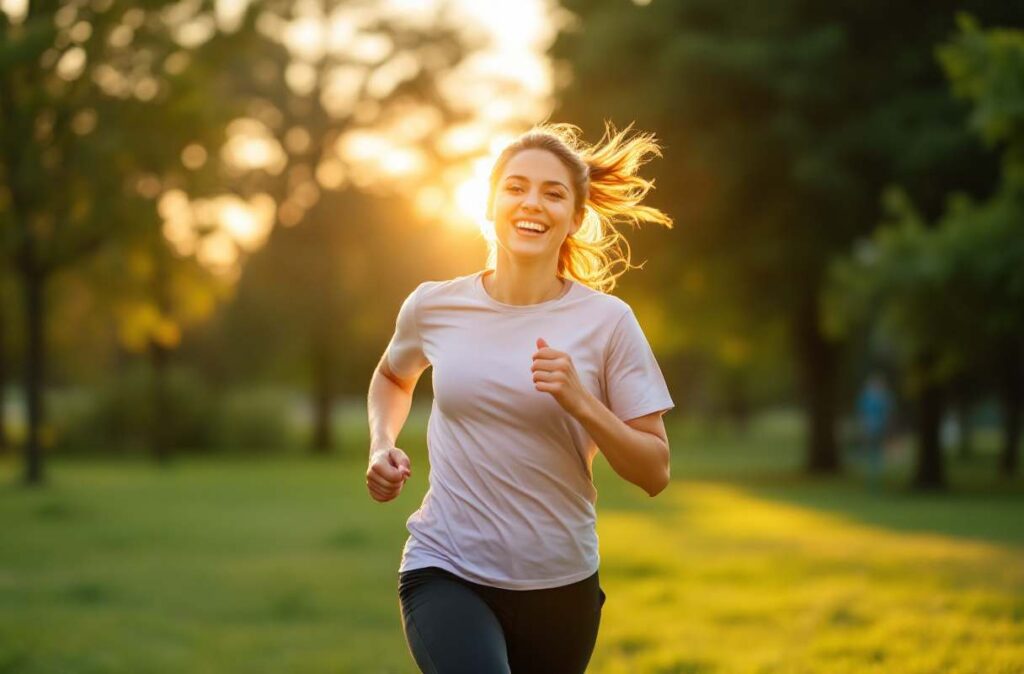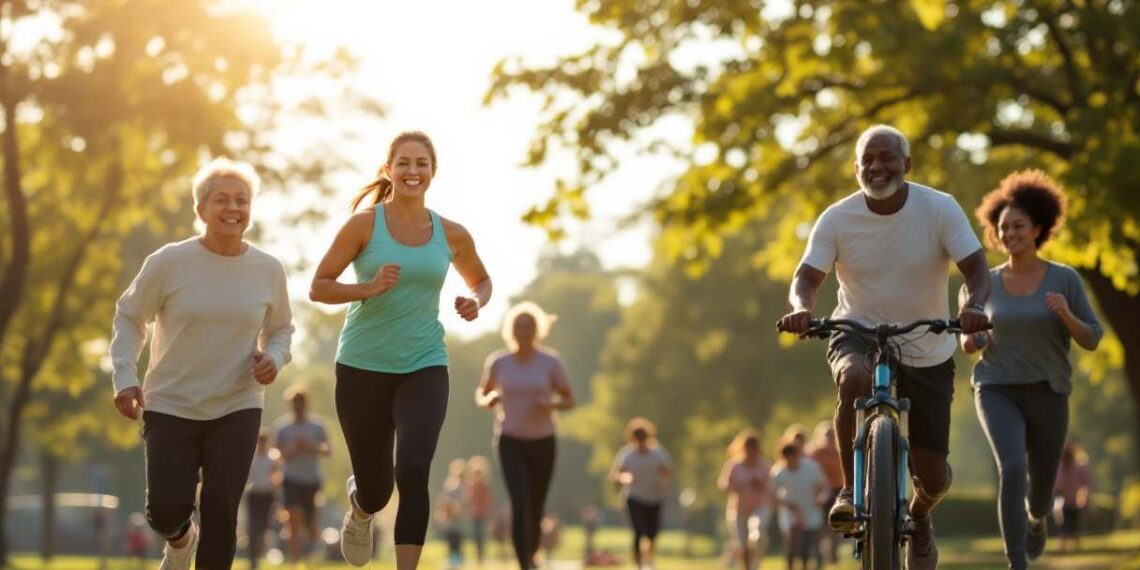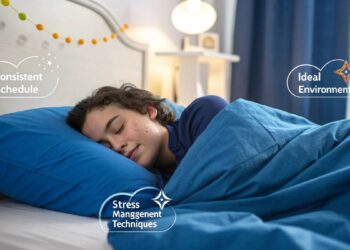Ever feel like you’re not living up to your full potential? What if the key to unlocking a happier, healthier, and more energetic version of yourself is as simple as incorporating regular exercise into your routine? Dive into how making movement a part of your daily life can revolutionize not just your body but your mind and overall well-being.
Understanding Sleep Challenges
Common Sleep Issues Among Seniors
As folks age, catching those Zs can get trickier. It’s like sleep starts playing a game with our bodies. Seniors often find themselves facing sleep spats like:
- Insomnia: Struggles in catching sleep or staying asleep
- Sleep Apnea: Breathing hiccups during snooze time
- Restless Leg Syndrome: That annoying urge to jiggle legs, stealing sweet dreams
- Frequent Awakenings: Finding themselves awake more times than they’d like throughout the night
These slumber snafus really cramp the lifestyle. They can be a not-so-fun part of aging, possibly stirred up by health bumps, pesky medication quirks, or a restless body clock.
Exercise is not just about building the body; it’s about building the mind.”
Importance of Quality Sleep for Seniors
Sleep isn’t just a nightly chore; it’s a magic potion for staying sharp and spry. Good snooze habits can bring a heap of perks like:
- Brain Boost: Keeps memory, focus, and smart choices in tip-top shape
- Body Health: Backs up immune troops, mends muscles, and keeps that heart ticking smoothly
- Mood Balancer: Chills stress, anxiety, and those pesky blues
- Energy Blast: Ensures you bounce out of bed ready to tackle the day
Cutting corners on sleep? Not so fast! It might muddle your brainwork, invite pesky chronic issues, and dim that spunky spark for life. Tackling sleep woes and trying out some natural sleep aids can boost life’s quality a big notch.
| Snooze Boosts | What It Means |
|---|---|
| Brain Boost | Sharpens memory, focus, and decision-making |
| Body Health | Fortifies immunity, mends muscles, bolsters heart |
| Mood Balancer | Tames stress, angst, and gloominess |
| Energy Blast | Sparkles up daytime wakefulness and pep |
Taking a peek at natural sleep aids for elderly like melatonin supplements, valerian root for sleep, and natural sleep aids for insomnia might serve up safe and sound alternatives to live those nights without counting sheep.
Lifestyle Changes for Better Sleep
Establishing a Consistent Sleep Routine
Sticking to a regular sleep schedule can be a game-changer for sleep quality, especially for those with a few more candles on the birthday cake. When you hit the hay and rise with the roosters at the same time every day, your body’s internal clock, also known as your circadian rhythm, gets the memo. This can help you drift off easier and may even say “bye-bye” to tossing and turning.

Here’s a practical way to nail down that sleep routine:
- Set a steady bedtime and rise time: Keep them the same, even on those lazy Sundays.
- Start a pre-sleep wind-down: Things like curling up with a book, soaking in a warm bath, or tuning into some calming tunes tell your body it’s a countdown to snooze time.
- Control the catnaps: If a nap’s a must, keep it a quick 20-30 minutes, and try not to doze off too late in the day.
- Dodge sleep stealers before bed: Skip heavy workouts, big meals, caffeine, and tech gadgets post-dinner.
| Task | Suggested Timing |
|---|---|
| Bedtime | 10:00 PM |
| Rise Time | 6:00 AM |
| Nap Cap | 20-30 minutes (early afternoon) |
Creating a Relaxing Sleep Environment
To snag some solid sack time, crafting a chill sleep setting is key. There’s no plumbing required, just a few tweaks here and there to turn your bedroom into a sleep oasis.
Essentials to ponder:
- Cushy Mattress and Pillows: Make sure your bed’s just the right level of comfy. Swap out tired ones to keep the cool dream vibes alive.
- Room Coolness: Set the room to 60-67°F (15-20°C) for a refreshing, sleep-inducing climate.
- Light Control: Embrace blackout curtains or a sleep mask to feel like you’re in a cozy cocoon. Dim lights as you wind down to set the mood.
- Shush the Noise: Earplugs or a trusty white noise machine can keep the peace. Soft, soothing melodies also get a thumbs-up.
- Sniff the Calm: Lavender or chamomile scents can help the brain relax. Check out our tips on lavender oil for sleep for more.
- Stay Tidy: Keep it neat, free from clutter that might stress you out.
| Thing | Best Condition |
|---|---|
| Climate | 60-67°F (15-20°C) |
| Light Level | Dark (add blackout curtains) |
| Sound Level | Low (try white noise) |
| Bed Comfort | Top-notch mattress and pillows |
Shake up these routines and setups, and snooze-time will look a whole lot brighter. For a deeper dive into boosting sleep the natural way, sashay on over to natural ways to improve sleep.

Natural Sleep Aids for Seniors
Elders wrestling with the odd sleepless night can find peace with gentle, natural remedies that promise a good night’s shut-eye. Let’s chat about four favorites among the seasoned crowd: Melatonin, Valerian Root, Lavender, and Chamomile Tea. No sleeping pills are needed, Grandma!
Melatonin as a Sleep Regulator
Think of Melatonin as the body’s internal lullaby, the hormone coaxing you gently into dreamland. But sneaky old age sometimes dials down the melodious tune, making sleep elusive. Popping a Melatonin supplement might just get that rhythm back on track, offering a restful reprieve.
| Age Group | Recommended Dose |
|---|---|
| Golden Oldies | 1-3 mg |
| Spring Chickens | 0.5-1 mg |
Curious about how Melatonin can be your sleep fairy? Swing by our article on melatonin supplements.
Valerian Root for Calming Effects
Meet Valerian Root, nature’s chill pill. This unassuming herb likes to dabble in chemistry, cranking up the brain’s soothing chemicals to calm the nerves and hush the mind’s chatter. Seniors often turn to it when the Sandman takes his sweet time arriving.
Eager for more on Valerian Root’s calming magic? Peep our detailed breakdown over at valerian root for sleep.
Lavender for Relaxation
Lavender’s fragrance is the epitome of “Ahhh…” Wafting its way into aromatherapy, this purple delight lulls one into tranquility. Dabble a bit of lavender oil in a diffuser or tuck some fragrant sachets under your pillow. Sleep smells so good.
To master the art of lavender-induced relaxation, wander over to our guide on lavender oil for sleep.
Chamomile Tea for Sleep
Chamomile Tea, the cozy legend of bedtime sips. With antioxidants that whisper sweet sleep into your brain, a warm cup before jumping into the sheets wraps up your day with a soothing bow.
| Preparation Method | Chamomile Dosage |
|---|---|
| Tea | 1 cozy cup |
| Extract | 1-2 ml |
Our tea time chat goes deeper in the article on chamomile tea for sleep.
Giving a nod to these gentle, natural sleep aids could be a game-changer for older adults. Your night’s rest can bloom beautifully with a touch of nature. Dive into our comprehensive guide on natural sleep aids for elderly if you’re hungry for more dreamy info. Get cozy and sleep tight!
“The Brain-Changing Benefits of Exercise” by Wendy Suzuki
Incorporating Relaxation Techniques
Getting a good night’s sleep isn’t always easy, especially for seniors. But relaxation techniques can make a big difference. They help melt away stress and anxiety, making it easier to fall asleep and stay there. Two great approaches are deep breathing and progressive muscle relaxation.
Deep Breathing Exercises
Deep breathing is like a passport to dreamworld and it’s super easy! You can do it just about anywhere. It involves taking slow and deep breaths, which help calm your mind and body.
Steps to Take Deep Breaths:
- Find a Good Spot:
Sit comfy in a chair or lay down. Shut your eyes and rest one hand on your chest and the other on your belly. - Breathe In:
Take a deep sniff through your nose for 4 counts, feel your belly rise like bread in the oven. - Hold It:
Stay there, holding your breath for 7 counts. - Breathe Out:
Let it coast out through your mouth for 8 counts, feeling your belly lower. - Keep It Going:
Stick with this rhythm for a few minutes till you feel like a sleepy kitten.
Pair this with your bedtime routine – it’s a great way to drift into sleep or team it up with other natural sleep remedies.
Progressive Muscle Relaxation
Progressive muscle relaxation (PMR) is where you squeeze and release your muscles to flush out stress. It’s like a massage you give yourself.
Steps for Muscle Easing:
- Get Cozy:
Lie down and close your peepers. Breathe deeply to chill out. - Squeeze Each Muscle Group:
Start at your toes, squeeze those muscles hard for 5 seconds – feel like a statue. - Let Loose:
Release the squeeze and soak in the feel-good vibes for 10-15 seconds. - Move Up:
Go from calves to thighs, then tummy, chest, arms, and last but not least, your face, tensing and relaxing each. - Kick Back:
After hitting all groups, let your whole self swim in that relaxation river.
Include PMR every night to make your sleep peaceful. Pair it with soothing tunes or lavender oil for an extra nudge into slumber.
Both of these techniques help those hunting for sweet dreams naturally. For more sleep tricks, check out articles about sleep tips for anxiety and sleep help during menopause.
“Physical fitness is the first requisite of happiness.” — Joseph Pilates
Mindfulness and Meditation for Better Sleep
Bringing a bit of mindfulness and meditation into your nightly wind-down routine could be just the ticket for seniors looking to catch some better zzz’s. These soothing practices help quiet the chatter upstairs, ease away stress, and open the door to a peaceful night’s snooze.

Mindfulness Practices Before Bedtime
Mindfulness is all about living in the now without being too hard on yourself. For seniors, tapping into mindfulness before hitting the hay can make lights-out time way more chill. Here’s a couple of go-to moves:
- Breath Awareness: Tune in to each breath. Deep inhale, slow exhale. Feel the air waltz in and out—simple yet powerful.
- Body Scan: Give every part of your body its moment of zen. Head to toe, check for any tight spots and let them melt away.
- Gratitude Reflection: Think about the good stuff that happened today. A little thankfulness can shove stress and grumps right off the stage.
Making these mindfulness nuggets part of the daily routine could make settling in for sleep a breeze. Feeling curious about more down-to-earth sleep tricks? Peek at our chat on natural remedies for insomnia.
Guided Meditation for Sleep
Guided meditation is like having a sleep coach whispering sweet chill vibes. It’s a winner for seniors wrestling with bedtime jitters. Try out these mellow methods:
- Progressive Relaxation: Tense up, then ease off. It’s like giving each muscle a mini massage, leaving you all soft and floppy.
- Visualization: Craft your happy place in your mind—a quiet beach, a whispering forest. Let senses soak in the peace and quiet.
- Mantra Meditation: Repeat a touchstone word or phrase—“peace” or “calm” gets the job done—to weave a blanket of calm around your mind.
Going with guided meditation can gently lead seniors down the path to dreamland. Want more on how to kiss sleeping pills goodbye? Check out our scoop on non-prescription sleep aids.
Table: Effectiveness of Mindfulness and Meditation Techniques
| Technique | Description | Benefits for Sleep |
|---|---|---|
| Breath Awareness | Keep tabs on your breathing | Sends stress packing |
| Body Scan | Walk your mind’s eye over your body | Eases muscle tension, chills anxiety |
| Gratitude Reflection | Revisit happy highlights | Nudges focus from worries |
| Progressive Relaxation | Engage and then release each muscle | Offers deep relaxation |
| Visualization | Picture tranquil looks | Invites a mental getaway |
| Mantra Meditation | Whisper calming words or phrases | Serenely settles the mind |
Mindfulness and guided meditation are gentle, effective picks for boosting shut-eye for seniors. Craving more sleep inspo? Scamper over to our piece on natural sleep aids.
Herbal Supplements for Sleep Support
Natural sleep aids can be just the ticket for those looking to catch better z’s, especially for the older crowd. Among the garden’s best offerings, passionflower and lemon balm are champs at helping folks wind down.
Passionflower for Relaxation
Passionflower wears the crown when it comes to chilling out. This plant’s all the rage for seniors on the hunt for natural sleep aids for elderly folks. It works by boosting levels of GABA in your noggin, making nerve cells calm down a bunch.
| Benefit | What It Does |
|---|---|
| Helps You Unwind | Pumps up GABA levels |
| Lowers Anxiety | Soothes the nervous system |
| Smooths Sleep Out | Aids in peaceful slumber |
For seniors who find their sleep gets shuffled by anxiety, passionflower is a game-changer. Toss it into a tea or pop it as a supplement—either works wonders. Curious about how passionflower can tuck you in? Check out herbal sleep remedies.
Lemon Balm for Calming Effects
Lemon balm, known for its sweet, citrus scent, has long been used to smooth things over when stress tries to crash the party. It’s a buddy to anyone who wants better shut-eye.
| Benefit | What It Does |
|---|---|
| De-stress Your Mind | Brings calm vibes |
| Better Sleep Quality | Encourages relaxation |
| Tackles Insomnia | Makes falling asleep easier |
Whether you’re making a soothing cup of tea or taking a supplement, lemon balm’s got your back. It lends a hand to seniors facing bouts of sleeplessness or minor insomnia. For the full scoop on lemon balm’s sleepy-time powers, read up on natural sleep aids for insomnia.

Both these herbal allies, passionflower and lemon balm, offer a natural way to snooze soundly. They’re the gentle alternative to store-bought sleep helpers, putting relaxation and wellness front and center. Peek into our sleep support supplements guide for more natural snooze solutions.
If you’re interested in wandering down the path of other herbal heroes, consider digging into valerian root for sleep and chamomile tea for sleep, both famous for their dreamy benefits.
Conclusion
Embracing regular exercise isn’t just about physical transformation—it’s a holistic approach to enhancing every facet of your life. From boosting mental clarity and mood to reducing the risk of chronic diseases, the benefits are vast and accessible. So, whether it’s a brisk walk, a yoga class, or lifting weights, the path to a better you begins with that first step. It’s time to unleash your potential and experience the transformative power of consistent physical activity.
FAQs
- Why is regular exercise important for overall health?
- Regular exercise improves cardiovascular health, strengthens muscles, enhances flexibility, and boosts immune function, contributing to overall well-being.
- How does exercise benefit mental health?
- Exercise releases endorphins, which act as natural mood lifters, reducing stress, anxiety, and symptoms of depression while improving self-esteem.
- What types of exercise are most effective?
- A combination of aerobic (like jogging or cycling), strength training, and flexibility exercises provides comprehensive health benefits.
- How much exercise is recommended per week?
- Health experts recommend at least 150 minutes of moderate-intensity or 75 minutes of high-intensity exercise weekly, plus muscle-strengthening activities on 2 or more days.
- Can small amounts of exercise still make a difference?
- Absolutely! Even short, consistent bouts of physical activity can improve health markers and contribute to long-term wellness.
Additional Resources
- World Health Organization – Physical Activity Guidelines
- American Heart Association – Benefits of Physical Activity






